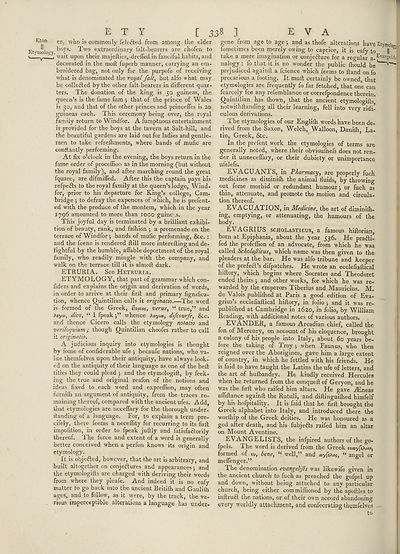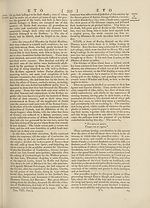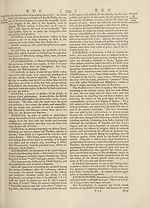Encyclopaedia Britannica, or, a Dictionary of arts, sciences, and miscellaneous literature : enlarged and improved. Illustrated with nearly six hundred engravings > Volume 8, ELE-FOR
(366) Page 338
Download files
Complete book:
Individual page:
Thumbnail gallery: Grid view | List view

E T Y t 338 ] EVA
Eton er, who is commonly fehcled from among the elder
jgt ‘*1 boys. Two extraordinary falt-bearers are chofen to
> , ' . wait, upon their majefties, dreffed in fanciful habits, and
decorated in the moft fuperb manner, carrying an em¬
broidered bag, not only for the purpofe of receiving
what is denominated the royal fait, but alfo what may
be collected by the other falt-bearers in different quar¬
ters. The donation of the king is 50 guineas, the
queen’s is the fame fum *, that of the prince of Wales
is 30, and that of the other princes and princeffes is 20
guineas each. This ceremony being over, the royal
family return to Windfor. A fumptuous entertainment
is provided for the boys at the tavern at Salt-hill, and
the beautiful gardens are laid out for ladies and gentle¬
men to take refrelhments, where bands of mufic are
conttantly performing.
At fix o’clock in the evening, the boys return in the
fame order of proceflion as in the morning (but without
the royal family), and after marching round the great
fquare, are difmiffed. After this the captain pays his
refpeifls to the royal family at the queen’s lodge, Wind¬
for, prior to his departure for King’s college, Cam¬
bridge j to defray the expences of which, he is prefent-
ed with the produce of the montem, which in the year
1796 amounted to more than 1000 guint ,s.
This joyful day is terminated by a brilliant exhibi¬
tion of beauty, rank, and falhion ; a promenade on the
terrace of Windfor $ bands of mufic performing, &c. :
and the fcene is rendered flill more interefting and de¬
lightful by the humble, affable deportment of the royal
family, who readily mingle with the company, and
walk on the terrace till it is almofl dark.
ETRURIA. See Hetruria.
ETYMOLOGY, that part of grammar which con-
fiders and explains the origin and derivation of words,
in order to arrive at their firfl and primary figmfica-
tion, whence Quintilian calls it originatio.—The word
is formed of the Greek, verus, “ true,” and
Atyoi, dico, “ 1 fpeak j” whence Aey«*, difcourfe, &c.
and thence Cicero calls the etymology notatio and
veriloquium; though Quintilian choofes rather to call
it originatio.
A judicious inquiry into etymologies is thought
by fome of confiderable ufe ; becaufe nations, who va¬
lue themfelves upon their antiquity, have always look¬
ed on the antiquity of their language as one of the beft
titles they could plead ; and the etymologift, by feek-
ing the true and original reafon of the notions and
ideas fixed to each word and expreffion, may often
furnifh an argument of antiquity, from the traces re¬
maining thereof, compared with the ancient ufes. Add,
that etymologies are neceffary for the thorough under-
itanding of a language. For, to explain a term pre-
cifely, there feems a neceffity for recurring to its firft
impofition, in order to fpeak juftly and fatisfa&orily
thereof. The force and extent of a word is generally
better conceived when a perfon knows its origin and
etymology.
It is objected, however, that the art is arbitrary, and
built altogether on conjectures and appearances j and
the etymologifts are charged with deriving their words
from where they pleafe. And indeed it is no eafy
matter to go back into the ancient Britifh and Gaulifh
ages, and to follow, as it were, by the track, the va¬
rious imperceptible alterations a language has under¬
gone from age to age; and as thofe alterations have EtymoW
fometimes been merely owing to caprice, it is eafy to 1) S
take a mere imagination or conje&ure for a regular a-Evangtli(h
nalogy: fp that it is no wonder the public fhould be'
prejudiced ag ain ft a fcience which feems to Hand on lb
precarious a footing. It muft certainly be owned, that
etymologies are frequently fo far fetched, that one can
fcarcely fee any refemblance or correfpondence therein.
Quintilian has Ihown, that the ancient etymologifts,
notwithftanding all their learning, fell into very ridi¬
culous derivations.
The etymologies of our Englilh words have been de¬
rived from the Saxon, Welch, Walloon, Danilh, La¬
tin, Greek, &c.
In the prefent work the etymologies of terms are
generally noted, where their obvioufnefs does not ren¬
der it unneceflary, or their dubiety or unimportance
ufelefs.
EVACUANTS, in Pharmacy, are properly fuch
medicines as diminilh the animal fluids, by throwing
out fome morbid or redundant humour j or fuch as
thin, attenuate, and promote the motion and circula¬
tion thereof.
EVACUATION, in Medicine, the art of diminifh-
ing, emptying, or attenuating, the humours of the
body.
EVAGRIUS scholasticus, a famous hiftorian,
born at Epiphania, about the year 536. He pra&i-
fed the profeflion of an advocate, from which he was
called Scholaficus, which name was then given to the
pleaders at the bar. He was alfo tribune and keeper
of the prefect’s difpatches. He wrote an ecclefiaftical
hiftory, which begins where Socrates and Theodoret
ended theirs $ and other works, for which he was re¬
warded by the emperors Tiberius and Mauricius. M.
de Valois publilhed at Paris a good edition of Eva-
grius’s ecclefiaftical hiftory, in folio ; and it was re-
publiftied at Cambridge in 1620, in folio, by William
Reading, with additional notes of various authors.
EVANDER, a famous Arcadian chief, called the
fon of Mercury, on account of his eloquence, brought
a colony of his people into Italy, about 60 years be¬
fore the taking of Troy ; when Faunus, who then
reigned over the Aborigines, gave him a large extent
of country, in which he fettled with his friends. He
is faid to have taught the Latins the ufe of letters, and
the art of hulhandry. He kindly received Hercules
w hen he returned from the conqueft of Geryon, and he
was the firft who raifed him altars. He gave ./Eneas
afliftance againft the Rutuli, and diftinguilhed himfelf
by his hofpitality. It is faid that he firft brought the
Greek alphabet into Italy, and introduced there the
worfliip of the Greek deities. He was honoured as a
god after death, and his fubjetts raifed him an altar
on Mount Aventine.
EVANGELISTS, the infpired authors of the go-
fpels. I he word is derived from the Greek ivccyfeAtor,
formed of iv, bene, “ well,” and ayfe/o?, “ angel or
meflenger.”
The denomination evangeli/ls was likewife given in
the ancient church to fuch as preached the gofpel up
and down, without being attached to any particular
church, being either commiflioned by the apoftles to
inftrudt the nations, or of their own accord abandoning
every worldly attachment, and confecrating themfelves
to
Eton er, who is commonly fehcled from among the elder
jgt ‘*1 boys. Two extraordinary falt-bearers are chofen to
> , ' . wait, upon their majefties, dreffed in fanciful habits, and
decorated in the moft fuperb manner, carrying an em¬
broidered bag, not only for the purpofe of receiving
what is denominated the royal fait, but alfo what may
be collected by the other falt-bearers in different quar¬
ters. The donation of the king is 50 guineas, the
queen’s is the fame fum *, that of the prince of Wales
is 30, and that of the other princes and princeffes is 20
guineas each. This ceremony being over, the royal
family return to Windfor. A fumptuous entertainment
is provided for the boys at the tavern at Salt-hill, and
the beautiful gardens are laid out for ladies and gentle¬
men to take refrelhments, where bands of mufic are
conttantly performing.
At fix o’clock in the evening, the boys return in the
fame order of proceflion as in the morning (but without
the royal family), and after marching round the great
fquare, are difmiffed. After this the captain pays his
refpeifls to the royal family at the queen’s lodge, Wind¬
for, prior to his departure for King’s college, Cam¬
bridge j to defray the expences of which, he is prefent-
ed with the produce of the montem, which in the year
1796 amounted to more than 1000 guint ,s.
This joyful day is terminated by a brilliant exhibi¬
tion of beauty, rank, and falhion ; a promenade on the
terrace of Windfor $ bands of mufic performing, &c. :
and the fcene is rendered flill more interefting and de¬
lightful by the humble, affable deportment of the royal
family, who readily mingle with the company, and
walk on the terrace till it is almofl dark.
ETRURIA. See Hetruria.
ETYMOLOGY, that part of grammar which con-
fiders and explains the origin and derivation of words,
in order to arrive at their firfl and primary figmfica-
tion, whence Quintilian calls it originatio.—The word
is formed of the Greek, verus, “ true,” and
Atyoi, dico, “ 1 fpeak j” whence Aey«*, difcourfe, &c.
and thence Cicero calls the etymology notatio and
veriloquium; though Quintilian choofes rather to call
it originatio.
A judicious inquiry into etymologies is thought
by fome of confiderable ufe ; becaufe nations, who va¬
lue themfelves upon their antiquity, have always look¬
ed on the antiquity of their language as one of the beft
titles they could plead ; and the etymologift, by feek-
ing the true and original reafon of the notions and
ideas fixed to each word and expreffion, may often
furnifh an argument of antiquity, from the traces re¬
maining thereof, compared with the ancient ufes. Add,
that etymologies are neceffary for the thorough under-
itanding of a language. For, to explain a term pre-
cifely, there feems a neceffity for recurring to its firft
impofition, in order to fpeak juftly and fatisfa&orily
thereof. The force and extent of a word is generally
better conceived when a perfon knows its origin and
etymology.
It is objected, however, that the art is arbitrary, and
built altogether on conjectures and appearances j and
the etymologifts are charged with deriving their words
from where they pleafe. And indeed it is no eafy
matter to go back into the ancient Britifh and Gaulifh
ages, and to follow, as it were, by the track, the va¬
rious imperceptible alterations a language has under¬
gone from age to age; and as thofe alterations have EtymoW
fometimes been merely owing to caprice, it is eafy to 1) S
take a mere imagination or conje&ure for a regular a-Evangtli(h
nalogy: fp that it is no wonder the public fhould be'
prejudiced ag ain ft a fcience which feems to Hand on lb
precarious a footing. It muft certainly be owned, that
etymologies are frequently fo far fetched, that one can
fcarcely fee any refemblance or correfpondence therein.
Quintilian has Ihown, that the ancient etymologifts,
notwithftanding all their learning, fell into very ridi¬
culous derivations.
The etymologies of our Englilh words have been de¬
rived from the Saxon, Welch, Walloon, Danilh, La¬
tin, Greek, &c.
In the prefent work the etymologies of terms are
generally noted, where their obvioufnefs does not ren¬
der it unneceflary, or their dubiety or unimportance
ufelefs.
EVACUANTS, in Pharmacy, are properly fuch
medicines as diminilh the animal fluids, by throwing
out fome morbid or redundant humour j or fuch as
thin, attenuate, and promote the motion and circula¬
tion thereof.
EVACUATION, in Medicine, the art of diminifh-
ing, emptying, or attenuating, the humours of the
body.
EVAGRIUS scholasticus, a famous hiftorian,
born at Epiphania, about the year 536. He pra&i-
fed the profeflion of an advocate, from which he was
called Scholaficus, which name was then given to the
pleaders at the bar. He was alfo tribune and keeper
of the prefect’s difpatches. He wrote an ecclefiaftical
hiftory, which begins where Socrates and Theodoret
ended theirs $ and other works, for which he was re¬
warded by the emperors Tiberius and Mauricius. M.
de Valois publilhed at Paris a good edition of Eva-
grius’s ecclefiaftical hiftory, in folio ; and it was re-
publiftied at Cambridge in 1620, in folio, by William
Reading, with additional notes of various authors.
EVANDER, a famous Arcadian chief, called the
fon of Mercury, on account of his eloquence, brought
a colony of his people into Italy, about 60 years be¬
fore the taking of Troy ; when Faunus, who then
reigned over the Aborigines, gave him a large extent
of country, in which he fettled with his friends. He
is faid to have taught the Latins the ufe of letters, and
the art of hulhandry. He kindly received Hercules
w hen he returned from the conqueft of Geryon, and he
was the firft who raifed him altars. He gave ./Eneas
afliftance againft the Rutuli, and diftinguilhed himfelf
by his hofpitality. It is faid that he firft brought the
Greek alphabet into Italy, and introduced there the
worfliip of the Greek deities. He was honoured as a
god after death, and his fubjetts raifed him an altar
on Mount Aventine.
EVANGELISTS, the infpired authors of the go-
fpels. I he word is derived from the Greek ivccyfeAtor,
formed of iv, bene, “ well,” and ayfe/o?, “ angel or
meflenger.”
The denomination evangeli/ls was likewife given in
the ancient church to fuch as preached the gofpel up
and down, without being attached to any particular
church, being either commiflioned by the apoftles to
inftrudt the nations, or of their own accord abandoning
every worldly attachment, and confecrating themfelves
to
Set display mode to:
![]() Universal Viewer |
Universal Viewer | ![]() Mirador |
Large image | Transcription
Mirador |
Large image | Transcription
Images and transcriptions on this page, including medium image downloads, may be used under the Creative Commons Attribution 4.0 International Licence unless otherwise stated. ![]()
| Permanent URL | https://digital.nls.uk/192268177 |
|---|
| Attribution and copyright: |
|
|---|
| Description | Ten editions of 'Encyclopaedia Britannica', issued from 1768-1903, in 231 volumes. Originally issued in 100 weekly parts (3 volumes) between 1768 and 1771 by publishers: Colin Macfarquhar and Andrew Bell (Edinburgh); editor: William Smellie: engraver: Andrew Bell. Expanded editions in the 19th century featured more volumes and contributions from leading experts in their fields. Managed and published in Edinburgh up to the 9th edition (25 volumes, from 1875-1889); the 10th edition (1902-1903) re-issued the 9th edition, with 11 supplementary volumes. |
|---|---|
| Additional NLS resources: |
|

